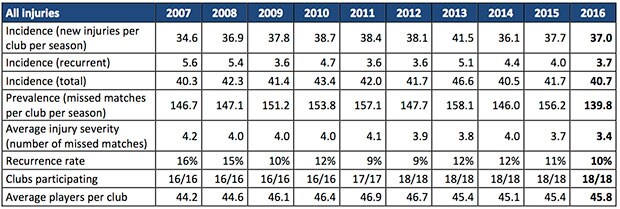THE NUMBER of games lost due to concussion is rising as more conservative management of the injury takes hold and better diagnostic techniques are adopted.
The 2016 AFL injury survey, revealed on Tuesday, shows the number of games lost to concussion has risen from 4.2 in 2015 to 5.6 in 2016.
The increase reflects a changing approach to concussion management as clubs and the AFL take a more cautious approach with the number of games lost increasingly significantly from just 1.4 in 2014.
However, the overall number of games lost to injury was at its lowest level since 2006 with 140 games lost per club during 2016.
The figure compared favourably to recent results showing 156 games were lost due to injury per club in 2015, 146 games in 2014 and 158 games in 2013.
The increase in games lost for concussion was offset in some part by reduced recurrence of shoulder, groin, hamstring, calf and quad strains as well as ankle sprains in the past decade.
In 2016, the average injury recurrence rate for such ailments was just 10 per cent – a significant drop from 2007 when such injuries recurred at 16 per cent, an indication of improved injury management.
The increase in the number of games lost due to concussion was not unexpected with a range of match day and post-game initiatives introduced in recent seasons to improve the diagnosis of players during games and the monitoring of players who are concussed.
Hawkeye vision has been introduced to the bench to allow medical staff to replay incidents and watch them from a range of angles while games are progressing ensuring medical staff have more complete information on players who receive head knocks.
The AFL also follows the guidelines incorporated during the Fifth International Consensus Conference on Concussion in Sport, including an updated SCAT test that was introduced this season to assess players.
Attendees at the AFL Concussion Symposium in March 2017 were reminded as to how important assessment of concussion was for subsequent treatment.
The overall injury incidence of 37 new injuries per club remained stable with the average number of games missed per club of 139.8 games being lower than normal.
Hamstring injuries remain the bane of a footballer's existence with 19.7 matches missed per club while the management of calf injuries appears to have improved.
Changes to diagnostic protocols may explain the shift in matches lost to groin, hip and thigh injuries.


